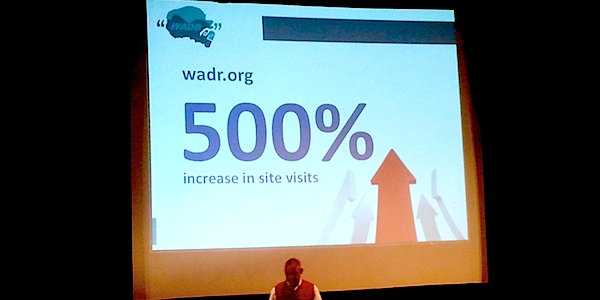Five social media lessons learnt from West Africa Democracy Radio

How can we better use social media to build democratic societies? That was the burning question last week in Accra, Ghana at the West Africa Civil Society Institute's Social Media Conference.
I was asked to present on the strategies, successes and lessons learnt at West Africa Democracy Radio. In 2011, I helped to build a new radio and web platform for the network. That relaunch used Newscoop, Airtime and SoundCloud and won a Knight-Batten Award for Innovations in Journalism. The project made it onto the SoundCloud blog and was the subject of this fantastic article on co.EXIST.
At the time of writing, West Africa Democracy Radio has nearly 80,000 followers on SoundCloud. By way of comparison, France 24, the Paris-based news broadcaster with a budget of approximately €100 million per year, has 40,000. SoundCloud is a social media platform that gives WADR a unique reach. Since last year, they've uploaded over 4500 audio clips which are downloaded daily in 180 countries.
Of course, the project was not an unqualified success. Training new staff remains a challenge, as does maintaining the motivation for all journalists. Persuading them to take time out to be social can be tricky. WADR are also looking at ways of improving the use of the channels that push the audio files (primarily Facebook and Twitter). Understanding the analytics is crucial for reporting and wider work must be done to train others to identify and capitalise on trends. Finally, while the SoundCloud numbers are impressive, engagement and sharing could be deeper.
These, therefore, are five lessons we learnt, that we hope could help other radio stations wanting to get networked online.
1. Be social.
Place social media at the heart of your vision from day one. Social network activity shouldn't just be a broadcasting of existing strategies, but involved in any kind of communications and outreach strategy from the beginning. That way, your newsroom's personnel can become true social native natives.
2. Go open source
Of course we would say that, but speaking platform-agnostically, open source is the way forward. It allows a rapid development not found in proprietary systems (within a comparable time frame) and allows for tweaking. For instance, WADR upgraded almost their entire site to the new HTML5 SoundCloud players within minutes after a few tweaks of the Newscoop templates.
3. The medium is the message
There are a lot of social platforms. You don't need to be on every one. West Africa Democracy's Radio's power and expertise is in its audio content. SoundCloud was a natural fit.for their audience. Audio also consumes less bandwidth than video and SoundCloud's content distribution network is fast, so listeners do not have to wait a long time for files to stream (or postponed download for later listening)
4. Act local, think global
SoundCloud players allow third parties to embed shows and clips on blogs and other websites, thus allowing WADR to reach a larger audience than it would if the clips were stored exclusively on their site. Despite this, they still produce local news about local matters. Important to their diaspora, but also causes international news organisations to come knocking when they need a regional expert.
5. Remain credible.
WADR taught us that credibility is everything. You can have the best network in the world, but your journalistic content has to be credible. Also, don't try and be CNN or the BBC if you're not. Be experts in your field, every day, and that may well be enough to put your newsroom on the social map.
